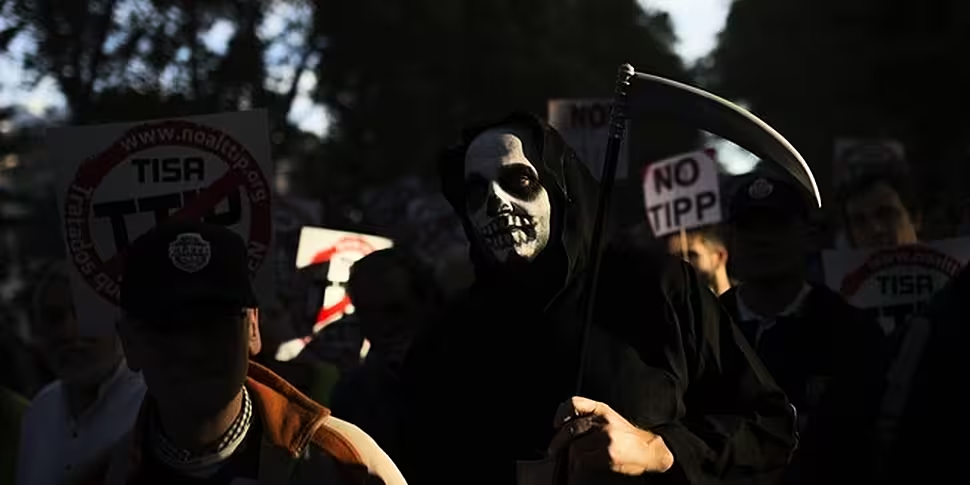The European Union has given Belgium until later today to end its opposition to the Comprehensive Economic and Trade Agreement (CETA) - a free trade deal between the EU and Canada.
The Belgian government cannot agree to the deal without the consent of its five regional counsels, including Wallonia, a French-speaking region in the south which has opposed the deal.
CETA is a northerly cousin of the Transatlantic Trade and Investment Partnership (TTIP), the proposed agreement to deregulate trade between the US and the EU, which now seems to be dead in the water.
The EU states that CETA would "help to generate growth and jobs by boosting exports; lowering the cost of the imports businesses need to make their products; offering greater choice for consumers; and upholding the EU's strict standards for products".
What are people afraid of?
The main point of contention is the investor-state dispute settlement (ISDS) mechanisms included in these agreements.
This allows businesses to take legal actions against governments who introduce new laws which threaten future anticipated profits.
John Oliver tackles ISDS mechanisms
These cases are heard by a three person international tribunal. While courts like this have been criticised for a lack of transparency, the EU says that it has taken a number of measures to address these concerns and to make the legal process as fair and open as possible.
Famously, the ISDS provision in a free trade agreement between Australia and Hong Kong allowed the tobacco company Philip Morris to attempt to sue the Australian government after it introduced plain packaging laws.
Paul Magnette, Wallonia's socialist leader, highlighted this issue as the sticking point in negotiations, saying: "Difficulties remain, especially on a symbolic and extremely important politically issue: the settlement mechanism."

Geert Vanden Wijngaert AP/Press Association Images, Donald Tusk
The EU has moved to reassure individuals that the power of states will not be compromised by the deal.
"CETA makes clear from the outset that the EU and Canada preserve their right to regulate and to achieve legitimate policy objectives, such as public health, safety, environment, public morals, social or consumer protection, and the promotion and protection of cultural diversity," an EU document on these provisions states.
It adds that: "a claim cannot be brought to investment dispute settlement simply because an action has an impact on investors’ profits," but critics have taken issue with the wording of the agreement.
"The mechanism is not described with precision [...] It's like buying a cat in a bag," Mr Magnette told the Walloon parliament in Belgium.

Alik Keplicz AP/Press Association Images
The EU states that the mechanism can be used when: "the investor is substantially deprived of the fundamental attributes of property such as the right to use, enjoy and dispose of its investment."
The treaty has been criticised for being overly complex and difficult to read, and the EU published the 1,500 page document without a table of contents, or an accompanying explanatory text.
The Canadian Centre for Policy Alternatives - an independent, left-leaning research institute - published a document called Making Sense of CETA. It comments that the EU and Canada commit "themselves to strong market access rules, prohibition of performance requirements, non-discriminatory treatment of foreign investors and high standards of investor protection," through the deal.
It continues: "Through the proposed ISDS mechanism, foreign investors will be granted the special privilege of suing host governments and claiming compensation for all kinds of state actions, while bypassing domestic judicial systems and their independent courts."
While the EU has tried to allay fears, it remains unclear what the full implications of the passing of the accord would be.
Irish stances
A non-binding cross-party motion in the Seanad rejected CETA. Sinn Féin referred to it as a "toxic" deal, while Fine Gael has supported the treaty.
In response to a parliamentary question on the deal, Minister for Jobs, Enterprise and Innovation Mary Mitchell O'Connor said:
"I support provisional application of CETA as I am keen to see Irish firms enjoy the tariff-free benefits and new opportunities as soon as possible included in the all-important chapters on public procurement, rules and tariffs. The issue of growing market share in other markets is made even more important by the result of the UK referendum on its membership of the EU."

Niall Carson PA Wire/PA Images
Ahead of this year's general election, Fine Gael said that it would ensure that Irish interests are safeguarded during trade negotiations, while Taoiseach Enda Kenny has been a vocal supporter of TTIP.
After the vote, Sinn Féin Seanad spokesperson on Foreign Affairs, Trevor Ó Clochartaigh said:
"Sinn Féin have been campaigning in relation to the very serious concerns around CETA for a long time. Our MEP’s have been highlighting the lack of transparency over the negotiations and drafting of this agreement, but have been blocked all the way by Fine Gael and their sister parties in Europe.
"Legal advice obtained by Matt Carthy MEP indicates that the creation in the agreement of a Permanent Investment Court, removed from any national accountability for the benefit of international investors and multinationals, will infringe on our constitution and will be to the detriment of our citizens."
Belgian pressure
After years of negotiations, European Council president Donald Tusk will speak to Belgian prime minister Charles Michel later on Monday, according to Reuters. Canadian prime minister Justin Trudeau is due to fly to Brussels to sign the deal on Thursday, but if the Belgian region holds-out then this trip, and an accompanying EU/Canada summit, will be postponed, The Guardian reports.
"Regarding Thursday, if Belgium is not in a position to say that they guarantee they can sign, it’s very clear for Tusk that it doesn’t make sense to have a summit, and there will be no summit, and there will be no date set for a new summit," a source told the newspaper.
For now all eyes remain on the south of Belgium - while the broader public push back against both this deal and TTIP (and a growing backlash against the ideals of 'free trade') might mean that European politicians and bureaucrats will approach future deals with greater caution.









